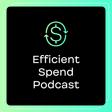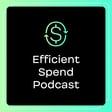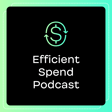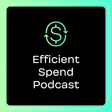
AI Ads, Performance Creative, and the Ready Set Journey | John Gargiulo
The Efficient Spend Podcast helps start-ups turn media spend into revenue. Learn how the world's top marketers are managing their media mix to drive growth!
About the Host: Paul is a paid marketing leader with 7+ years of experience optimizing marketing spend at venture-backed startups. He's driven over $100 million in revenue through paid media and is passionate about helping startups deploy marketing dollars to drive growth.
About the Guest: John is the CEO and co-founder of Ready Set, a performance creative agency serving brands like Coinbase, Hims and Hers, and Smile Direct Club. With 15 years of creative strategy experience and a previous stint as a global product marketing lead for Airbnb, he brings a wealth of experience to understanding creative production at scale.
VISIT OUR WEBSITE: https://www.efficientspend.com/
CONNECT WITH PAUL: https://www.linkedin.com/in/paulkovalski/
CONNECT WITH JOHN: https://www.linkedin.com/in/john-gargiulo/



